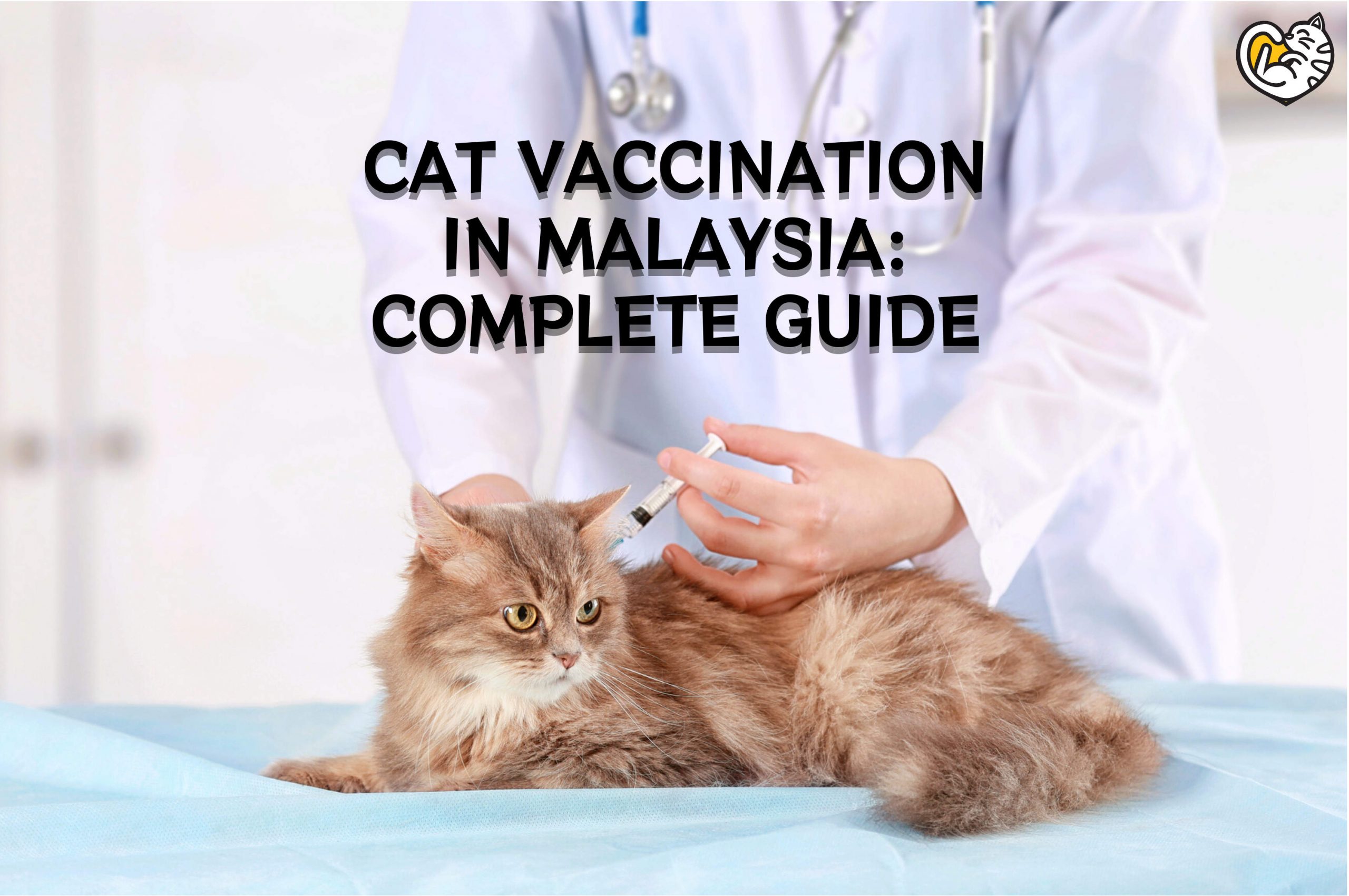Cat Vaccination in Malaysia: Complete Guide

Cats are prone to many diseases, whether a kitten or a mature family cat. As a cat owner, it is your duty to protect your feline pal against these diseases. To achieve this, it is important to vaccinate your cat against these infections. As cat vaccination is one of the most controversial topics in the pet world, it can be challenging to know which vaccinations are necessary for your cat and which are optional. This article will look at the different types of cat vaccinations, the price for cat vaccinations in Malaysia, and whether they are necessary for your cat’s health. Also, we will try to answer some of the most frequently asked questions about cat vaccinations.
Want your cat to live the longest, healthiest, and happiest life?
It starts with what’s in their bowl.
Every meal is a chance to give your cat more energy, fewer vet visits, a shinier coat, and a longer, happier life by your side.
Choose food that truly understands your cat’s needs.
Choose Grace Cat. 🐾
Malaysia’s First Freeze-Dried Complete Meal With Krill Oil & Postbiotic
What is Cat Vaccination?
A vaccine is a combination of molecules injected into the body to activate an immune response to a particular disease. It is an antibody, virus, or something that stimulates the immune response in a cat’s body so that the body can recognise and fight a pathogen when it encounters the body.
To protect your cats against dangerous and sometimes life-threatening infections, you need to vaccinate your cats. And when it comes to cat medication, there is no such thing as a “one-size-fits-all” strategy medicine. Vaccines for your cat will differ depending on your cat’s lifestyle.
Age for Cat Vaccination
Generally, kittens should receive their first cat vaccination as early as 2 months of age (8 weeks kitten). The kitten will receive a total of three vaccinations by the age of 4 months old or more, with an interval of 3-4 weeks between each vaccination.
After a year or so, when the kitten becomes adult, a booster vaccine should be given. Then, repeat the booster with an interval of one to three years depending on the type of vaccine and your cat’s risk of exposure to the particular diseases.
Types of Cat Vaccination in Malaysia
Cat vaccination in Malaysia is typically divided into two types: the core and the non-core vaccinations.
The core vaccine includes all-purpose vaccines that can be given to any cat, while the non-core feline vaccines should only be given after carefully considering the requirements. Therefore, before administering any cat vaccination, your vet should assess which is best for your cat’s health.
Core Cat Vaccines
The core vaccine includes injection for:
- Feline Panleukopenia Virus or Feline Parvovirus (FPV)
More commonly known as feline distemper, FPV attacks the blood cells and kills all the defence cells in the body. It is a highly contagious and potentially life-threatening disease. Cats can be infected by exposure to the infected felines’ urine, stool, nasal secretions and even the fleas from the infected cats.
- Feline Viral Rhinotracheitis (FVR)/Feline Herpesvirus (FHV) and Feline Calicivirus (FCV)
These highly contagious viruses are two of the most common causes of upper respiratory infections (URIs), or cat flu. The disease symptoms may include eye or nasal discharge, development of ulcers and sneezing. Many cats infected with FHV will become life-long virus carriers after recovery, whereby the virus will survive inactively in the body. Stress and a poor immune system can cause some cats to shed viruses again.
- Rabies virus
The rabies virus can affect any mammals, especially carnivores. Rabies is a viral disease spread from wild animals’ saliva to unvaccinated domestic animals and even humans, most commonly through bites. Most rabid animals show severe behavioural change and paralysis due to central nervous system disturbance.
Rabies vaccine is required in East Malaysia (Sabah and Sarawak) and many other countries but is not a core vaccine for domestic cats in Peninsular Malaysia.
The above are among the most common viruses in the environment, and your cat is susceptible to them. As a result, administering these cat vaccinations is vital for your cat’s health. Your veterinarian will give you specific instructions on how often and when to vaccinate your kitten.
Non-core Cat Vaccines
Non-core vaccines are suitable for some cats depending on their lifestyle; they are only administered to cats if their circumstances suggest that they are at a higher risk of contracting a particular disease. Your veterinarian will advise you on which non-core vaccinations your cat needs. The following are some of the non-core vaccinations:
- Feline Leukemia Virus (FeLV)
It is a retrovirus that only affects cats. It can be spread from infected kittens when they transfer saliva or nasal secretions. If not defeated by the body’s immune system, the virus can weaken the cat’s immune system, leading to a fatal illness. It is also a common cause of cancer in cats. Feline 2-FeLV is the only feline leukaemia virus vaccine that has been shown to be effective in vaccinating cats against feline leukaemia viruses.
- Bordetella bronchiseptica
This bacteria causes a respiratory infection called “Feline bordetellosis” in kittens. The symptoms are pretty similar to those of viral upper respiratory disease. It is not common in senior cats and can be treated with antibiotics.
- Chlamydophila felis
Chlamydia is a bacterial infection that causes acute conjunctivitis, i.e., the inflammation of the membrane that covers the front of the eye and the inner of the eyelids. Vaccination against the infection is usually included in the mixture of the distemper vaccine.
In most cases, non-core vaccines are unnecessary if your cat stays all the time indoors. But, if it comes into contact with other outside cats, it may contract these deadly infections. It is a good idea to consult your vet if these non-core cat vaccinations are necessary for your cats.
Do Indoor Cats Need Vaccination?
Most cat owners believe that their cats do not need vaccinations because they live indoors. This is a misconception because exposure can happen in several ways. Your cat does not have to be near a sick kitty to catch an infection; you could be the carrier. Although the Feline Leukemia virus disintegrates quickly in the environment- probably can live only a few hours outside a cat’s body, the Herpesvirus can live for a day or two, the Calicivirus for a week to a month, and the Panleukopenia virus for can survive for up to a year.
Thus, there is a good chance that when you come in and out of your house, you are bringing inactive and infectious virus particles that will infect your cats, notwithstanding whether they are indoor or outdoor cats.
The only effective way to protect cats from these diseases is to vaccinate them. According to veterinarians, all indoor cats should receive core vaccines to protect them from a wide range of highly contagious diseases. It ensures that they are safe from illness if they escape from your home, go for grooming, or stay in a boarding facility.
Should My Cat Get Non-core Vaccines As Well?
The decision to vaccinate your cat with a non-core vaccine depends on a thorough examination of your cat’s age, lifestyle, exposure to other cats, vaccination history and other factors. In some circumstances, vaccines are used in treating the infected cat. Knowing that all treatments have some risk, the dangers of a particular vaccine must be weighed against the potential benefit specific to each cat illness.
A cat may require these vaccines if it comes into contact with infectious organisms through living in a shelter, having outdoor access, or sharing a home with infected cats. Contact your veterinarian to know if any non-core vaccines are suitable for your cat.
Vaccine Schedule for Cats
If you are having trouble determining when the right time is to vaccinate your cats, you can refer to our simple cat vaccination schedule:
Core Vaccines
- F3: Feline Viral Rhinotracheitis, Calicivirus, Panleukopenia (FVRCP)
Known as core cat vaccine F3 or Tricat Vaccine (FVRCP), it is a combination shot that protects your cats against FVR/ FHV, FCV and FPV. This vaccination can be given as early as 6 weeks of age, and then every 4 weeks until the kitten reaches the age of 16 weeks. Under normal circumstances, a kitten shall have received 3 shots of vaccine by 4 months of age.
For adult cats with unknown vaccination history, two doses of FVRCP should be given, with 3 to 4 weeks intervals.
A booster should be administered for all cats every 1 to 3 years.
- Rabies
Can be administered at 12 weeks of age or older, followed by a booster every 1 to 3 years.
Non-core Vaccines
- Feline Leukemia Virus (FeLV)
A cat can receive this vaccine as early as 9 weeks. A total of 2 doses should be given, with a 3 to 4 weeks interval.
- Bordetella bronchiseptica
One dose is recommended for kitten with at least 16 weeks old. The cat should receive an annual booster if it mixes with other cats.
- Chlamydophila felis
Vaccination should be given for cats at risk of infection, particularly in a multi-cat household, and if there is a history of chlamydial disease. Generally, the vaccination begins at 8 to 9 weeks old with a second injection 3 to 4 weeks later, at approximately 12 weeks of age. Cats that are at continued risk of infection should receive an annual booster.
How Effective Are Cat Vaccines?
Vaccines must meet stringent government requirements, and makers must demonstrate that vaccination is safe and effective before administering to cats. With attention and high standards, the veterinary vaccines used nowadays are the safest and most protective.
However, no vaccine is 100% effective, and not every cat receives the same level of protection. As a result, even vaccinated cats should be kept away from other cats and places where infectious agents may be prevalent.
Vaccination against these viruses is quite efficient and plays a significant role in preventing illness in cats, especially given how infectious the virus is. The virus can live and grow for long periods, and vaccination is the only effective strategy to protect your cats.
When Will the Vaccine Take Effect?
The immunity does not take effect immediately after a vaccine. A cat will not be fully protected until around 7 to 10 days after the second vaccination. True immunity is unknown until the kitten reaches the age of 16 to 18 weeks, or until all kitten vaccinations are complete. Avoid exposing your kitten to unknown animals until it has had all of the core vaccines.
Is a Booster of Cat Vaccines Necessary?
Most adult cats that have received the full series of vaccines as kittens should thereafter receive vaccine booster annually or every three years based on a lifestyle risk assessment. Many veterinarians recommend revaccinating low-risk adult cats every 3 years for the core vaccines. Most cats appear to benefit from booster vaccinations that prevent the reemergence of once-common fatal infections. Research has shown that abstaining from specific boosters can put your cat at risk.
To know whether boosters are really necessary for your cat, blood tests are sometimes recommended to measure the number of antibodies. Unfortunately, these tests are usually more expensive than revaccination and can be stressful for your feline pal. Besides, just because your cat has a high serum antibody in the blood does not mean that these antibodies will provide adequate protection against the disease if your cat is at risk of exposure to the infection.
Potential Side Effects of Cat Vaccines
Most cats will not experience side effects from receiving a vaccination. If reactions do occur, they are generally minor and short-lived. However, keep in mind that some of the adverse side effects as follows can happen:
- Vomiting
- Diarrhoea
- Redness or swelling around the injection spot
- Rashes
- Fever
- Sneezing
- Loss of appetite
- Lethargy
If you feel your cat is suffering from severe side effects such as difficulty breathing, refusing to eat or drink, or if any of the adverse effects do not subside after 1 or 2 days, contact your veterinarian immediately. They can help you determine any special care that may be necessary.
What Should I Do With a Stray Cat I Have Taken in Without Knowing His Vaccination Status?
Because your stray cat status is unknown, you shall take your cat to a vet and make sure it received all the necessary shots at the time of your vet visit and a booster dosage after 12 months. Stray cats require the proper medical attention to rule out any respiratory problems, worms and other diseases. If the cat’s vaccination history or the age vaccinated is unknown, the veterinarian will undoubtedly recommend vaccinations before the cat leaves the clinic, even if it is in good health.
2023 Private Clinics Cat Vaccination Price in Malaysia
Some of you may be wondering what is the cat vaccine price in Malaysia? As at year 2023, every shot of cat vaccine charged by private clinics generally costs around RM50 to RM80, depending on the geographical location and the type of vet clinic.
How Much Does Cat Vaccination Cost At Government Clinics?
Cat vaccination costs are usually lower at government veterinary clinics or hospitals, which is around RM40 per shot (as at year 2023). So, if you are looking for a cheaper price for cat vaccination, please visit a government veterinary clinic which is available across Malaysia. Some other non-government animal organisation also provide low-cost cat vaccines from time to time.
Conclusion: Cat Vaccination in Malaysia
Just like any other vaccination program, a cat vaccination schedule should be a follow-up to ensure your cat’s health and well-being for the rest of its life. You may not be able to control all of your cat’s health problems, but with the proper vaccine, you can prevent your cat from contracting most of the feline infectious diseases. If your cat has reached the age for vaccination i.e. 8 weeks old, please arrange for vaccination as early as possible in order to protect your cat from potential diseases.
Looking for a happy meal for your cat? Try this.
Still feeding low-quality pet lick treat to your pets?
You could be giving them a time bomb in disguise — one that slowly harms their health, weakens their immunity, and makes them sick.
It’s time to switch to safer, healthier options — before it’s too late.
Try out our gloow Nutrition Pet Lick – The first Algal Oil & Postbiotic Pet Lick in Malaysia










Chlamydophila Felis , hi saya nak Tanya kucing penyakit ini, boleh quation untuk pembedahan ni.
Hi… sila bawa kucing ke klinik haiwan, biar doktor check dulu ya.